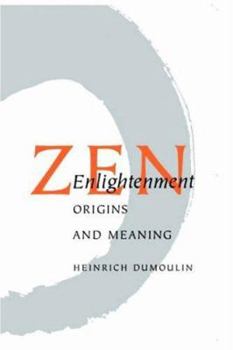Zen Enlightenment: Origins and Meaning
Select Format
Select Condition 
Book Overview
Enlightenment, the cosmic experience of universal unity, is a notoriously elusive concept in Zen. Here, the renowned scholar Heinrich Dumoulin traces the development of Zen and the concept of... This description may be from another edition of this product.
Format:Paperback
Language:English
ISBN:0834801418
ISBN13:9780834801417
Release Date:June 1979
Publisher:Weatherhill
Length:175 Pages
Weight:0.65 lbs.
Dimensions:0.5" x 5.8" x 8.3"
Customer Reviews
2 ratings
Outstanding introduction, not to be missed
Published by Thriftbooks.com User , 15 years ago
Without a doubt, this book is one of the best introductions to Zen available. For those who may not want to work through Father Dumoulin's two volume history of Zen Buddhism, this short book provides an excellent overview of the subject while not neglecting important and decisive historical details in Zen's development. Dumoulin's writing is clear and understandable with terms well defined, and anyone with a casual or nascent understanding of Buddhism would benefit from the erudition on its pages. Personally, I did not find the book to be all that "academic." Dumoulin's efforts to define Zen's development in a systematic and historically contextualized manner around the theme of "Zen enlightenment" would address, I think, an important mainstream interest in the pithy center of Zen practice. What is Zen about? While it is true that Zen practice requires its adherents to engage in a sort of mental iconoclasm applied to discursive and rationalizing thinking, nobody says that to have a satori experience you must have the intellect akin to vegetation. There are plenty of smart guys who have been enlightened--Dogen comes to mind. To draw a distinction between "this knowledge and that knowledge" is to invite a dualism that most Zen masters, I think, would eschew. Dumoulin addresses the issue on page sixty two citing that "Lin-chi did not at all discard the wealth of learning he had acquired as a youth when he turned to Zen, but rather integrated it into a transformed spiritual experience." Integration is the key to a spiritual life. This book is a worthy addition to anyone's library. Read it without fear. Dumoulin's efforts to write about Dogen in a book I consider "introductory" are laudable. Certainly not the easiest thinking to wrap your mind around in only a few pages. However, for those who want to learn more,Eihei Dogen: Mystical Realist, Revised, Third Edition, by Hee-Jin Kim, is still considered a "classic" in Buddhist publications. It would complement this purchase nicely.
The academics of enlghtenment
Published by Thriftbooks.com User , 17 years ago
The German Jesuit scholar Heinrich Dumoulin produced a formidable 2 volume history of Zen: Zen Buddhism: A History, India & China Zen Buddhism, Volume 2: A History (Japan) (Treasures of the World's Religions) This shorter work by him, although it provides some history of Zen, does so only with a focus on explaining, in an academic fashion, the role of enlightenment in Zen. It is derived from lectures he gave during or before 1976. I'd suggest keeping in mind, if one does read this book, that, as Dumoulin observes, one of the greatest Zen masters, Hui-Neng, could not read or write, let alone understand such a scholarly presentation of Zen. Nevertheless, this book may provide some context for understanding Zen Buddhism and its practices. Even so, its coverage of contemporary enlightenment experiences, centering on the forced methods of Harada school, will seem unusual to any one studying Soto Zen: it centering did to me. Of course, if you are an academician, this book may be ideal for you, although even then you may find the chapter of Dogen's metaphysics tough going, perhaps less so depending on your familiarity with Mahayana Buddhism. Some of the useful historical background includes: - Indian roots, noting the similarities between Yoga and zazen (e.g. the lotus pose) - legendary founding in China by Bodhidharma - the Mahayana foundation of Zen - how Taoism influenced the development of Zen - Hui-Neng and enlightenment as sudden not gradual - Lin-Chi and the beginning of Rinzai school - the beginning of the use of systematic methods: zazen and koans - Zen's entry into Japan - Dogen and the Soto sect: his emphasis on zazen and the metaphysics of the Buddhanature The historical elements I found well-presented and useful. The explanation of Dogen's teaching I found too academic and rather hard to follow (where's Brad Warner where we need him, for which see the less complete but considering easier to follow Sit Down and Shut Up: Punk Rock Commentaries on Buddha, God, Truth, Sex, Death, and Dogen's Treasury of the Right Dharma Eye) Dumoulin mentions the early Chinese Zen poem "Faith in Mind" that contains many Taoist elements. You can read a commentary on this poem that can also guide your Zen sitting practice by Master Sheng-yen in Faith in Mind: A Commentary on Seng Ts'an's Classic. If you practice Soto Zen, you may want to skip or at least lightly browse, the final 2 chapters on Contemporary Accounts and Satori. It will seem baffling and probably quite contrary to what your Soto Zen master has taught. Whether anyone actually can have a liberating experience of any value using the approach of the Harada school I almost doubt; can the master really recognize a meaningful satori of the disciple or is there some sort of collusion involved? I suppose I'm too suspicious but my limited practice has been Soto and quite undramatic compared to what is described here. Nevertheless, I feel I have made some progress in expe






